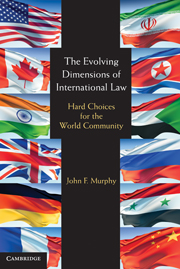Book contents
- Frontmatter
- Contents
- Acknowledgments
- Introduction
- 1 The Multifaceted Nature of International Law
- 2 International Institutions
- 3 Who Shall Enforce the Peace?
- 4 The Law of Armed Conflict
- 5 Arms Control, Disarmament, Nonproliferation, and Safeguards
- 6 Human Rights
- 7 International Environmental Issues
- 8 Causes of the Present Malaise, Concluding Observations, and a Prognosis
- Index
- References
Introduction
Published online by Cambridge University Press: 05 June 2012
- Frontmatter
- Contents
- Acknowledgments
- Introduction
- 1 The Multifaceted Nature of International Law
- 2 International Institutions
- 3 Who Shall Enforce the Peace?
- 4 The Law of Armed Conflict
- 5 Arms Control, Disarmament, Nonproliferation, and Safeguards
- 6 Human Rights
- 7 International Environmental Issues
- 8 Causes of the Present Malaise, Concluding Observations, and a Prognosis
- Index
- References
Summary
The American Society of International Law held its centennial annual meeting in March 2006, and it was a love fest – a celebration not only of the Society but of international law. Rossalyn Higgins, President Judge of the International Court of Justice, gave the plenary address, and her speech was a panegyric to international law and international institutions. Judge Higgins's remarks reflected the overall tone of the conference; few, if any, of the events at the Society's meeting would lead one to believe that international law and international institutions face any problems of significant consequence.
It is possible, however, to paint a considerably less rosy picture. There are disquieting signs that international law and international institutions face a problematic future. With respect to international institutions, the recently issued Final Paper of the Princeton Project on National Security made the perhaps somewhat hyperbolic claim that: “The system of international institutions that the United States and its allies built after World War II and steadily expanded over the course of the Cold War is broken. Every major institution – the United Nations (U.N.), the International Monetary Fund (IMF), the World Bank, the World Trade Organization (WTO), the North Atlantic Treaty Organization (NATO) – and countless smaller ones face calls for major reform.” Similarly, a Geo-Strategic Environment Workshop held at the U.S. Naval War College from August 24–25, 2006, “revealed significant concern about the vitality of international law and institutions” and concluded that “some international organizations are looking long in the tooth and incapable of coping with emerging challenges” and that “bilateral agreements are on the rise as international organizations continue to fall short in their objectives.”
- Type
- Chapter
- Information
- The Evolving Dimensions of International LawHard Choices for the World Community, pp. 1 - 11Publisher: Cambridge University PressPrint publication year: 2010



